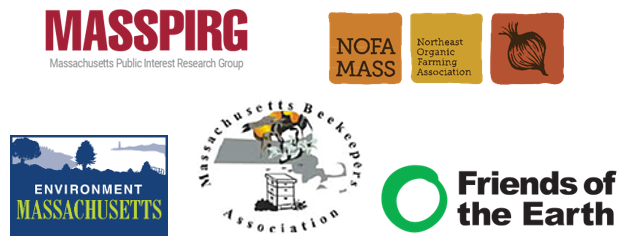Deirdre Cummings
Legislative Director, MASSPIRG
617-747-4319
[email protected]
Legislative Director, MASSPIRG
617-747-4319
[email protected]

State-funded study confirms “neonics” pesticides harmful to pollinators
Coalition calls for immediate action to protect bees
BOSTON — A coalition of beekeepers, public health, farming and agriculture and environmental organizations praised the findings of a recent report issued by the Massachusetts Department of Agriculture (MDAR). With this week being National Pollinator Week, the 24 groups also aptly called on the department to take immediate action to protect bees.
MDAR revealed overwhelming evidence in its scientific literature review that neonicotinoid insecticides (“neonics”) are harming pollinators. The research found that the broad majority of impact-based studies reviewed (42 of 43) cited “neonics” as a contributor to pollinator declines, and pointed out that the only study with mixed results was industry-funded.
“The evidence is clear, and action is long overdue,” said Deirdre Cummings, MASSPIRG legislative director. “We must ban the use of dangerous pesticides which are harming pollinators.”
In the last decade, declining pollinator health, specifically among honeybee and wild bee populations, has been a cause for concern both in Massachusetts and around the country. In 2017, Massachusetts beekeepers reported a 64.9 percent annual loss in colony numbers.
Support for protecting bees and other pollinators and significantly restricting the use of neonics is widespread. H. 763, An Act to protect Massachusetts pollinators, filed by state Rep. Carolyn Dykema and a bipartisan group of 153 legislative sponsors in Massachusetts. The bill is supported by Attorney General Maura Healey and more than 100 local organizations and is pending in the legislature’s House Ways and Means Committee.
“Science has clearly shown what many of us have suspected for a long time: that unchecked and widespread use of neonicotinoid pesticides has seriously damaging effects on pollinator health. This should be a concern to all of us given the key role pollinators play in food production and the health of our natural ecosystems,” said Rep. Carolyn Dykema. “Now is absolutely the time to prevent further harm by restricting use of these harmful products.”
Given the Department of Agriculture’s own findings, the coalition is calling for the department to take immediate action to restrict the use of neonics by administratively implementing the provisions of H.763. “If the department won’t take action, then the legislature should not delay in passing the bill,” said Martin Dagoberto, policy director of the Northeast Organic Farming Association of Massachusetts.
“As representatives of the beekeepers of the Commonwealth of Massachusetts, given the clear need to fill a gap in federal regulation in a time of ecological collapse, we at Mass Bee are counting on the Department of Agriculture to protect the health and ecological integrity of our Commonwealth,” said Peter Delaney, president of the Mass Beekeepers Association, in testimony on neonics.
Bees play a vital role in the ecosystem. They pollinate much of the food we depend on, and without them, we wouldn’t have such staples as apples, broccoli, coffee beans or even chocolate. In addition, bees pollinate alfalfa, one of the main crops on which dairy cows feed. This means bees affect whether we have milk, cheese and ice cream.
“Bees are a key piece of our food system, and it’s encouraging to see MDAR catching up on the science,” said Jason Davidson, food and agriculture campaigner with Friends of the Earth. “For the sake of our food supply and our environment, we cannot afford to delay protecting Massachusetts’ pollinators any longer.”
This coalition represents a broad variety of groups working toward protecting bees, which pollinate 71 of 100 crop species which provide food worldwide.
“A world without bees would mean a world without many of our favorite summer foods,” said Ben Hellerstein, state director for Environment Massachusetts. “Across Massachusetts, thousands of people have spoken out to save our pollinators. I hope we’ll see MDAR take action soon.”
The organizations which signed onto the joint testimony included:
Bee Friendly Williamstown, Caretaker Farm (Williamstown, MA), Center for Biological Diversity, EcoHealth Advocates, Environment Massachusetts, Friends of the Earth U.S., LEAD for Pollinators, Inc., Local Harmony (Leverett, MA), Manda Farm (Plainfield, MA), Mass Audubon, Massachusetts Rivers Alliance, Massachusetts Sierra Club, MASSPIRG, Native Plant Trust, Natural Resources Defense Council, NOFA/Mass, Plainfield Agricultural Commission, Pollinators Welcome, Regeneration Massachusetts, Round the Bend Farm (Dartmouth, MA), That’s A Plenty Farm & Pollinator Habitat (Northampton, MA), Toxics Action Center and Western Mass Pollinator Networks
Mass Bee submitted individual testimony which aligned strongly with the joint testimony.
More Background: Based on mounting evidence, many scientists and beekeepers have identified the introduction of neonicotinoid pesticides as a primary reason for pollinator health decline. Neonicotinoids are a relatively new class of insecticides that, since their discovery in the 1980s, have become the most widely used insecticide worldwide. Neonics are systemic pesticides: once sprayed or coated on seed, the chemical is taken up into plant tissue and can remain in plants and soil long after application.
-30-